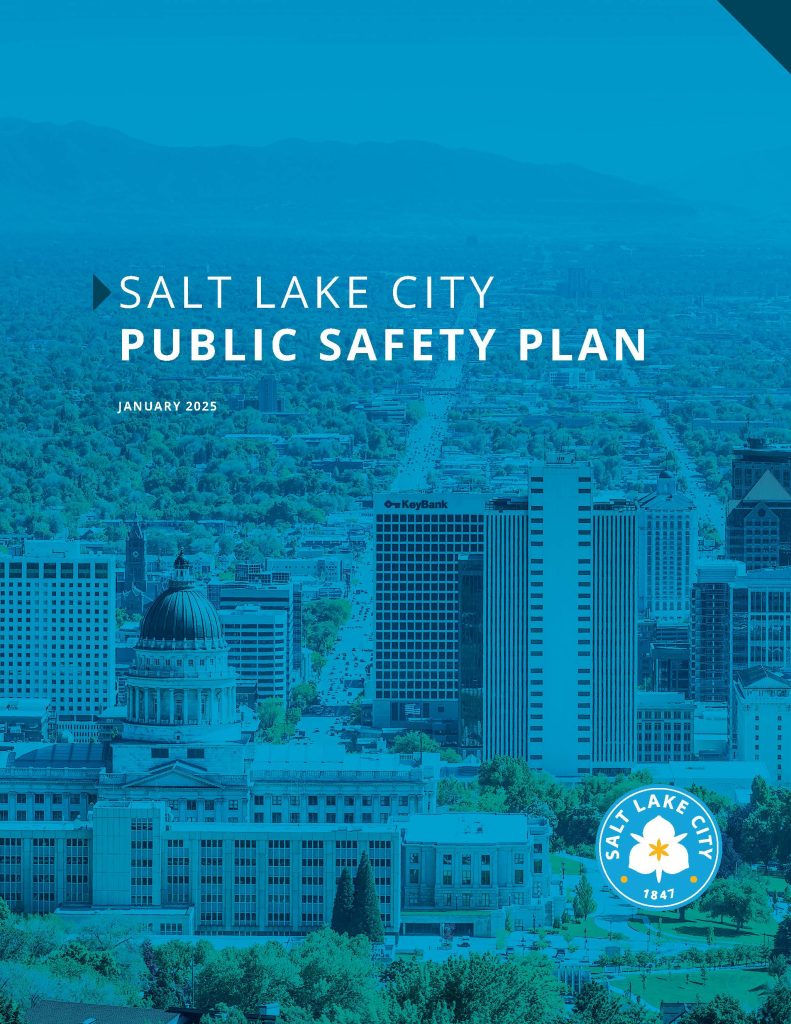If you or someone you know is experiencing or is at risk of experiencing homelessness, call: 801-990-9999.
Keeping the public safe is the most important duty of any city. Salt Lake City must continually strive to improve safety and ensure our public spaces are clean and inviting to residents and visitors. While experiencing homelessness is not a crime, we recognize that perceptions of safety, and at times actual safety, are heavily impacted by prevalent unsheltered homelessness.
Salt Lake City Public Safety Plan
In December 2024, Salt Lake City was invited by Gov. Spencer Cox, Senate President Stuart Adams, and Speaker of the House Mike Schultz to quickly produce a plan that addresses legitimate public safety concerns and makes clear recommendations to improve the system that has, for decades, prevented Utah and our capital city from successfully resolving the humanitarian crisis of homelessness on our streets.
Homeless Resource Center Squads
With mitigation funding from the State of Utah, the Salt Lake City Police Department (SLCPD) is able to employ two full-time police squads that are charged with proactive policing in the neighborhoods around the city’s two homeless resource centers. More information on these squads is available here.
Salt Lake City Police Department Community Connection Center
The Community Connection Center’s mission is to provide a safe environment for people to access individualized care, support, and appropriate community resources. This is accomplished through three teams.
Community Connection Team
The community connection team, which is comprised of case workers and social workers have become the liaisons between front line police work, the community, which includes service providers, and individuals/families that are in crisis. The Community Connection Team provides the following services:
- Triage of an individual and/or family
- Intermittent, short-term therapeutic intervention
- Care coordination between agencies
- Case Management, which includes but is not limited to:
- Housing Application and Navigation Assistance
- Basic Needs
- Navigation of the Behavioral Health System
Homeless Outreach Service Team (HOST)
The Homeless Outreach Service Team (HOST) is a proactive and collaborative effort to move the community in Salt Lake City, into a partnership with the police and homeless service providers to connect homeless individuals with social services and resources.
Crisis Intervention Team (CIT)
The Crisis Intervention Team (CIT) includes specially trained law enforcement officers that are trained to effectively deal with a situation involving a person experiencing a mental health crisis. CIT officers are trained to assist in identifying characteristics of various mental disorders. CIT officers provide a safer intervention for the person experiencing a mental health crisis, their family members, the community, and the officers themselves.
Salt Lake City Fire Department Community Health Access Team
Having social workers in emergency responses is critical for ensuring the well-being of residents in crisis. Firefighters and EMTs are trained and prepared for many emergencies, especially life-or-death scenarios, but they aren’t always as prepared to handle people who are in the middle of a mental health crisis or who are experiencing substance abuse problems. The CHAT is alerted during an original emergency dispatch so that a patient can receive the assistance they need as soon as possible. CHAT team members may direct a patient to mental health assistance, drug treatment options or even offer help while responding to a traumatic incident or call where someone has died.
New Police Substations
SLCPD police substations are not functional police stations, like the Public Safety Building or Pioneer Precinct. Substations are utilized primarily by the department’s Bike Squads, which are proactive squads focused on reducing street crimes and building relationships with community members. The substations give Bike Squads the opportunity to have a recharging location central to their patrol area.
There are multiple Substations in the city, including locations in the Ballpark neighborhood and new substations on North Temple and Regent Street.
Sequential Intercept Model (The Miami Model)
The Sequential Intercept Model (SIM) – or Miami Model – is a strategy to offer treatment and resources to individuals instead of incarceration. The SIM process brings together stakeholders, different agencies, and systems to work together to identify strategies to divert people with mental and substance use disorders away from the justice system into services that best support individual needs.
